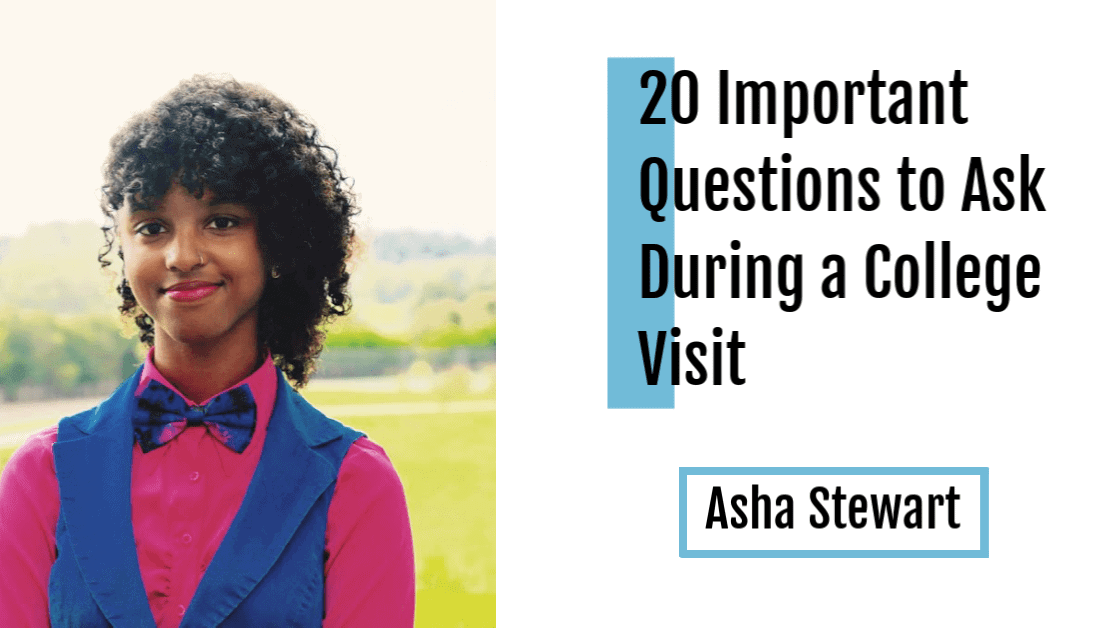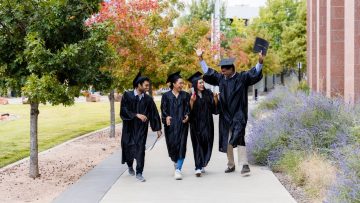20 Important Questions to Ask During a College Visit
Reviewed and edited by Tyson Schritter : 26 May, 2024.
My college visit to Sweet Briar during my senior year of high school consisted of me nervously following the student tour guide and my mother asking all the important questions I was too shy to ask. So when I became a student ambassador during the second semester of freshman year (after I had become more outgoing and less socially awkward), I decided to try my best to be an example of how college can help one get out of their shell.
What I have learned from my college tour and time at college is that a big part of growing up is realizing that, just as you have to ask other people questions to receive information, you must also ask yourself questions to see how said information will affect you personally.
The college experience is different for everyone, and there is no cookie-cutter list of questions that work for everyone. That’s why I believe it is important to use generic questions and then create an inner monologue with yourself to dive deeper into figuring out if a college is right for you.
Here are some Questions that may come in one’s mind before a college tour.
1.) Why am I interested in this college?
This question is really just for you to answer. Think of the reasons you are doing this college visit and think of the research you may have done. This is a great question to ask yourself as you arrive on campus. Maybe even write down the answers and review them after the tour.
College Visit: Academics to Consider During Your Campus Tour
2.) What is the average class size?
Ask yourself how much this matters to you. Can you work fine in large seminars? Or do you like more individualized attention?
3.) What is the student-to-professor ratio?
Just as with the class size, think about how this may affect you. A smaller student-to-professor ratio often means professors can get to know their students more and offer more personalized help.
4.) What kind of programs are here for the majors? (internships, summer work, etc.)
If you are not sure which specific major you are interested in, that is perfectly fine! Think about 3 or 4 that you would like to know more about as well as what type of work the college provides so you can get more experience in these majors.
5.) May I speak with the professor in charge of the _______ major? (If you are interested in one)
If you do have a specific major in mind, that’s great! Speaking with the professor in charge of the department for that major can be really helpful in your decision process and can spark ideas on how to make the most of this education.
6.) What is the graduation rate?
This is a very important question. Obviously, everyone’s life journey is different. However, knowing the average graduation rate can show that the college is doing something (or many things) right (or wrong).
Student Life
7.) May I visit the offices? (Student Life, Study Abroad, Registrar, etc.)
These offices are in charge of making sure the gears of your college life keep turning without a hitch. Meeting some of the people in charge can give you a look into some of the individuals who will be working to insure you have a dorm to sleep in, classes to take, food to eat, and many activities and opportunities that can shape you into a well-rounded young adult.
8.) Can I see a dorm? (From my experience, tours usually include a dorm showing, but keep this question in mind in case your tour does not!)
This is a great way to really think about whether or not you want to live on campus. If you do want to live on campus, take a good look at the dorm and try to imagine yourself in a space like it.
9.) What are some typical on-campus jobs?
Even if you were not thinking about getting a job on campus, or if you were thinking about finding a job off-campus, an on-campus job is a good way to get some pocket money while also learning to manage your time. In my experience, on-campus jobs take your class schedule into account so you are less likely to overwork yourself.
10.) What activities, on and off-campus, can I get involved in? (Other colleges may host things that students from your college can go to)
This is a great way to branch out and meet people who do not go to your college. Reflect on your interests. This is also a good way to get into community service!
11.) How is on-campus security, and how are emergencies handled?
If you see yourself working, living, being on the campus, it is always important to know the security of the campus.
12.) Is there transportation for students? (Especially important for those of us who do not have a car on campus!)
It can be a great experience to go on a Target run with fellow classmates or even have a ride to an event paid for by the college. Either way, it can cut down on gas costs if you do have a car and get you off campus more often if you do not!
13.) How accessible are study spaces? (Any 24-hour areas?)
The true college experience is having those times that an assignment requires a lot of your attention, you do not feel 100% ready before an exam, or you simply just procrastinated and, all of a sudden, it is one in the morning. Especially if you do not want to disturb your roommate or just cannot work in your dorm room, it is good to know that there are a variety of study spaces that are always open.
14.) How do I inquire about tutoring?
Often times, a student will realize that the same study practices they used in high school just do not work for college. Also, being in a different environment, living with a person you have never met, and being away from your family can lead to not-so-desired grades.
Think about what type of courses you are interested in taking and what you have a history of struggling in. And remember: it is not a bad thing to seek tutoring. Asking for help when you need it is the best thing to do.
After Graduation
15.) What kinds of jobs do students go into after graduation?
Often times, when on a college tour, students have all their focus just on college. But it is very important during a college visit to think about life after college and how well your school will prepare you for it.
16.) Do students usually get into a job related to what they studied?
Again, it is very easy to think only about college, but it is imperative to think about how you will be prepared to get into the field you are getting scholarships and paying money to get into. Of course, life can take people on many different paths than what they planned, but it is still a good idea to have a plan in the first place.
17.) How quickly do students find jobs after graduation?
This is an especially good question for those who have to take out loans. If the numbers reflect many students getting jobs soon after graduation, that means it is more likely that you will be able to do the same and get a headstart on paying off those loans.
18.) Are there resources on campus to help me find internships?
Advisors can help steer you in the right direction for internships. Think about (and do research on) what type of internships can work with your major and what career you would like to go into. If you are not sure, think about what really interests you.
19.) Are there resources on campus to help with résumés and preparing for jobs?
An office with a person whose job it is to help you find jobs can make life much easier. Even better if the school hosts or can take you to events like résumé workshops.
20.) How prevalent is the alumni involvement?
This may not be important to many people, but for me, it solidified my college decision. I have found that if the people who graduated a college are passionate about it enough to come back and help students, then they most likely had a very good experience. Also, there is more of a feeling of community and knowing you are not completely alone.
Just remember that your visit to college is an important step in growing into an adult. As scary as that is, the journey can be made a little less frightening with the right support. And finding the right support for you often starts with asking questions!
Meet our Ambassadors!
If you are interested in getting involved in our Student Ambassador program, contact Erin Pettus at erin@collegesofdistinction.com.
Learn More About Sweet Briar College
Established in 1901, Sweet Briar is a private liberal arts and sciences college for women of consequence. The College’s unique community and campus life foster strength and resilience in every student by surrounding her with excellent faculty, coaches, and staff who challenge her to bring her best self forward—and to own it with confidence, courage, and grit. In 2018, U.S. News & World Report named Sweet Briar among the nation’s Most Innovative Schools.




